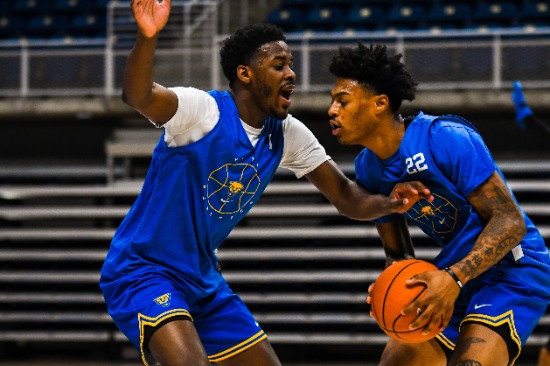Column┃Nike Sibande and the NCAA’s transfer problem

Photo courtesy of Justin Pondexter | Pitt Athletics
Pitt senior guard Nike Sibande transferred from Miami (Ohio) to the University of Pittsburgh this past summer.
November 13, 2020
The NCAA’s system for obtaining immediate eligibility goes against the best interest of the student-athletes who it’s meant to protect.
If an athlete transfers while on scholarship from one Division I school to another, they will most likely have to sit out a full season in their sport unless they can receive a waiver for immediate eligibility.
The NCAA defines a waiver as “an action that sets aside an NCAA rule because a specific, extraordinary circumstance prevents you from meeting the rule.” Without a waiver granted by the school the student athlete wishes to transfer from, student athletes must sit an entire year.
So why transfer and risk having to sit out? Moving from a smaller school to a more established program increases national exposure and can increase the competition level that the student-athlete experiences. With more attention and better opposition, student-athletes have a better chance at advancing their sports careers to the professional level. Transferring can also help athletes get through personal situations that can prevent the student-athlete from achieving their goals, needing a change of scenery to start fresh.
One case here in Oakland exposes the issues within the NCAA’s transfer system and its policies for obtaining immediate eligibility.
Pitt basketball senior guard Nike Sibande transferred from Miami University (Ohio) to Pitt this past summer, after emerging as a rising star in his first three seasons. Sibande stated in his waiver request that he’d made the decision to continue caring for his infant daughter, who had relocated to Pittsburgh with her mother.
Not only would this transfer help Nike’s personal life, but it could help him advance his basketball career. Going from a quiet school like Miami to a power-five school in Pittsburgh will greatly increase his national exposure and likely benefit him if he wants to play in the NBA or overseas after college.
Rather than acting in the best interest of the student-athlete, Miami denied Sibande’s waiver request, making Sibande ineligible for this season. Sibande’s decision hurts Miami as he led the team in both scoring and rebounds last season. Miami head coach Jack Owens seemed devastated by Sibande leaving.
“I love the kid who I poured three years of my life into and wish him nothing but the best,” Owens said.
ESPN college basketball analyst Jay Bilas, who has criticized the NCAA’s transfer process in the past, asked Owens why Miami had attempted to block Sibande’s waiver request, and Owens in turn provided false information about Sibande’s motivations for relocating. Bilas attributed this confusing situation as a potential emotional response from Miami. He suggested that maybe the staff felt frustrated by the departure of a student-athlete they’d spent lots of time on leaving the program, and decided to punish him by providing an extra roadblock.
Sibande averaged 15.1 points per game in three seasons at Miami, shooting 41.4% from the field. The Panthers desperately need a player with the offensive skill set that he brings. Pitt lacks depth at the guard position, with junior guard Trey McGowens transferring to Nebraska and graduate player Ryan Murphy transferring to Tulane this offseason. Pitt has appealed the NCAA’s waiver decision, and a reversal would skyrocket the Panthers’ chances of a successful season.
The issue here lies in the power dynamics at play. The school from which a player wishes to transfer holds far too much power over that player’s future at his new destination. The school the student athlete wishes to leave can choose to act selfishly, like in Sibande’s case, creating an unnecessary roadblock in the player’s career.
Division I sports are extremely competitive, and teams often act in their own best interest rather than in the best interest of the student-athletes. Teams work hard to recruit players, and smaller schools work hard to find talented student-athletes. Schools will continue to do this if it doesn’t break any NCAA rules. The NCAA should protect the student-athletes by reducing schools’ power in this situation.
The NCAA must remain careful in making new rules, as giving too much power to the student-athletes can cause players to transfer more frequently with less reason for doing so. Without proper caution, the transfer system could turn into a college version of free agency.
To avoid something like this from happening, the NCAA should consider forcing athletes unable to receive waivers to sit out half of a season rather than a full season to still serve as a counter-incentive to leaving, but allow for the student-athlete to develop in their sport in the season following their transfer. The NCAA should also limit the number of times a student athlete can receive a waiver in order to keep student athletes from transferring multiple times.
The NCAA needs to take away the power that the schools have in the say of whether or not a student-athlete can obtain a waiver to become immediately eligible. They can do this by completely removing the school’s involvement in the process of acquiring a waiver. Instead, the NCAA should solely require student-athletes to provide sufficient reason for their transfer in order to obtain a waiver for immediate eligibility. This way, the NCAA can decide from an unbiased standpoint.
The NCAA states its core purpose as governing “competition in a fair, safe, equitable and sportsmanlike manner.” The NCAA needs to rewrite their policies on transferring and restructure their waiver system so that it protects student-athletes and provides them with the opportunities needed to succeed.







